Posts Tagged ‘cycling’
Attorney David White to Speak at Boston Cycling and Health Expo about Insurance for Cyclists
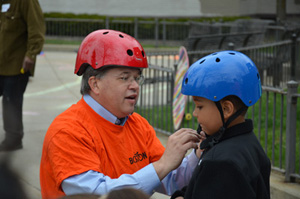
Attorney David W. White of Breakstone, White & Gluck will speak this weekend about how cyclists can purchase accident coverage to protect themselves from injuries and lost wages. White will speak at the Boston Cycling and Health Expo at 12:30 p.m. Saturday at the Westin Boston Waterfront. His talk is free and open to the public.
Cyclists often ride around with small amounts of coverage because they are unaware of how easy and relatively affordable it is to purchase extra coverage through their Massachusetts auto insurance policies. Drivers in Massachusetts are required to carry auto insurance, but they often carry very little and in some cases, none at all. If a cyclist is hit by a driver with inadequate insurance, he or she may be left without the compensation that is needed to fully recover and pay for medical expenses, bills, and the physical injuries.
White will talk about two ways cyclists can protect themselves by:
- Purchasing adequate amounts of Underinsured and Uninsured Motorist coverage
- Purchasing adequate Medical Payments coverage
Want to learn more before the event? Read our article, What Every Massachusetts Bicyclist Needs to Know About Car Insurance.
White will review the key parts of a Massachusetts auto insurance policy and explain the different options for cyclists to obtain compensation for injuries, including their own health insurance and no fault benefits. He will also discuss medical liens that health insurance companies may place on a personal injury case.
Cyclists who do not own cars may still be able to benefit from coverage if they live in a household with a car.
About Attorney David W. White
White is a Boston personal injury lawyer who has specialized in bicycle accident cases for over 25 years. He is a past president of the Massachusetts Bar Association. He is a frequent lecturer at continuing legal education programs and other events.
About the Boston Cycling and Health Expo and MassBike Bike Night
The Boston Cycling and Health Expo begins Friday and will host vendors from throughout New England who offer cycling, sports equipment and services aimed at healthy living. It starts at 2 p.m. Friday at the Westin Boston Waterfront at 425 Summer Street. It is also open Saturday from 9 a.m. to 5 p.m. Two notable events: MassBike will host its Bike Night and Fashion Show on Friday, starting at 6:30 p.m. Then on Saturday, the expo will start with a group bike ride around the City of Boston.
Breakstone, White & Gluck Booth
Breakstone, White & Gluck will have a booth and we invite you to stop by. Our lawyers and staff will be demonstrating how to use the firm’s new Boston cycling app. The smart phone app provides users with safety tips from our lawyers, an easy way to store your health insurance information and tools to gather information at the scene if you are in an accident. We will also be sharing pictures from our work donating youth bike helmets to Boston Bikes, Cycle Kids, Bikes Not Bombs and other organizations this spring. Learn more.
Bike Helmets in Boston
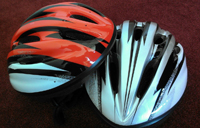 If you were in Boston last week, there is a good chance you saw a few cyclists. It was Bay State Bike Week and cyclists came out strong for events and group rides.
If you were in Boston last week, there is a good chance you saw a few cyclists. It was Bay State Bike Week and cyclists came out strong for events and group rides.
While many cyclists were wearing helmets, a new report says not all are. According to the City of Boston Cyclist Safety Report, from 2009 to 2012, cyclists were wearing helmets in less than 50 percent of incidents responded to by Boston Emergency Medical Services (Boston EMS).
Women wore helmets in 60 percent of incidents while men wore them in 43 percent.
Overall, the city reports 72 percent of cyclists citywide are wearing helmets.
Cyclists who wear bike helmets reduce their risk of head injury in a cycling accident by as much as 85 percent and the risk of brain injury by as much as 88 percent, according to the National Highway Traffic Safety Administration.
The city’s report shows bike accidents in Boston have increased from 2010 to 2012. The Boston Police Department reports a 2 percent increase while Boston EMS reports 9 percent. Nine cyclists died in accidents, including five in 2012. Ridership has also increased over this time as the city expanded infrastructure and launched the Hubway bike share program, making hundreds of new bikes available for short-term rentals.
Boston Bikes (the office which manages the city’s bike programs) reported a 16-28 percent increase in bike trips over that period. In the city’s report, Mayor Thomas Menino has pledged to decrease the cyclist crash injury rate by 50 percent by 2020.
Bike Helmets in Boston
In Massachusetts, cyclists who are 16 years of age or younger must wear helmets while riding bicycles, under M.G.L. c.85 Section 11B. The helmet must be secured to the cyclist’s head with straps and meet standards established by the U.S. Consumer Product Safety Commission.
But they are important for cyclists of all ages. The Boston cyclist safety report, which was produced by a number of city offices, has a long-term goal of passing a law requiring cyclists of all ages to wear helmets in Boston.
The city has tried to make discount helmets available to riders, launched a $40,000 “Wear a Helmet” advertising campaign promoting helmet usage and plans to install helmet vending machines at Hubway bike share stations. It also stresses helmet usage through its community programming.
In addition, Hubway riders agree to wear helmets as part of their rental agreement. But a study last year revealed many riders are not holding up their end of the deal. In the study, researchers at Beth Israel Deaconess Medical Center reported 80 percent of bike-share users in Boston and Washington D.C. were not wearing bike helmets. By contrast, riders who owned their own bike wore their helmets about half the time.
The study’s author wrote that head injury accounts for about one third of all bicycle injuries and about three-quarters of all bicycle-related deaths.
Bike Helmet Law for Boston?
Boston was one of the first cities in the country to offer bike sharing. It would be leading the way again if it passed a law requiring cyclists of all ages to wear helmets. Massachusetts, the District of Columbia and 21 other states require cyclists under 16 to wear helmets, but there are no states which mandate use by adults, according to the Insurance Institute for Highway Safety.
There are other cities and towns with laws or ordinances requiring helmets be worn by cyclists of all ages, including Dallas, Texas and Sykesville, Maryland. There is a bill proposed in the Legislature to make Maryland the first state to require cyclists of all ages to wear helmets.
In Washington State, more than two dozen communities have laws or ordinances requiring helmets to be worn by all ages, but there is no statewide law.
Boston Bike Season Begins: Tips to Protect Yourself
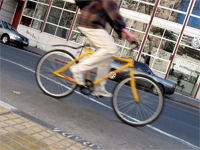
After a long, hard winter, cyclists are finally enjoying a taste of spring weather. All across Massachusetts, bikes are being pulled out of storage, tuned up, and taken back out on the road.
Boston celebrates the return of the nation’s premier bike-sharing program, Hubway, which is celebrating its third season in town. The program has now expanded from Boston to Cambridge, Somerville and Brookline. And today, to celebrate opening day for the Red Sox, Hubway is having a Rolling Celebration ride through the cities.
If you are a Massachusetts bicyclist, now is a good time to review some important rules and regulations, as well as some important insurance tips:
Roads. You can travel on the side of the road or in the middle of the lane. Up to two cyclists can ride abreast in a lane. Many communities also offer designated bike lanes and shared lanes. Turns to the left can, and should, be made from the left-most lane.
Cars. Cars must give you the right of way; they cannot turn left in front of you unless it is safe to do so; they may not make a right turn in front of you if they have just passed you; they must pass at a reasonably safe distance, or wait until it is safe to do so.
Sidewalks. You are allowed to ride on sidewalks outside business districts, unless prohibited by local regulations.
Pedestrians. Remember to give pedestrians the right of way and warn pedestrians you are overtaking or passing them. You should have a bell or horn on your bicycle, and there is nothing wrong with a friendly “Passing on your right.”
Bike Helmets. Helmets are required for cyclists ages 16 and younger in Massachusetts, but they are also an important tool for riders of all ages. Head injuries are among the most serious injuries a cyclist can sustain in a bike accident. In 2009, 630 cyclists died in the United States and 91 percent were not wearing helmets, according to the Insurance Highway Safety Institute.
Bike Lights and Reflectors. If you ride in the dark (one-half hour after sunset or one-half hour before sunrise), make sure your bike has lights and reflectors. You must have a white light facing forward and a red light facing backward. Cyclists must have reflectors on their pedals or reflective material around their ankles. You can have as many lights as you like.
Bike Maps. Bike lanes and bike paths may offer safer travel options. Call your local town or city hall and ask if they produce a bike map so you can plan your route. These two are available online: Somerville Bicycle Map and the Boston Bicycle Map.
Bike Parking. You are allowed to park your bike in a bike rack or anywhere on a sidewalk or road, but your bike cannot obstruct pedestrians or motor vehicle traffic. See this map for Boston Bike Parking.
Bike Accidents. If you are in an accident, the most important step is to obtain medical care, even if you do not initially think you are seriously injured. If you are able, take pictures of the position of your bike and the car at the accident scene. Later, file a report with the local police department. Under the law, you must notify the police for any accident involving serious injury or over $100 or greater in property damage.
Protect Yourself With Adequate Insurance. Believe it or not, insurance on your own car may protect you if you are in an accident. Your car insurance may provide uninsured or underinsured coverage for serious injuries. Read our article, What Every Massachusetts Bicyclist Needs to Know About Car Insurance. Your homeowner’s policy may provide coverage for property damage.
Other Massachusetts Bicycling Resources
MassBike
What to Know About Cycling in Boston
Boston Bikes
City of Cambridge Police Page on Bike Safety
Somerville Bicycle Committee
Hubway Bike Share Program Returns to Boston
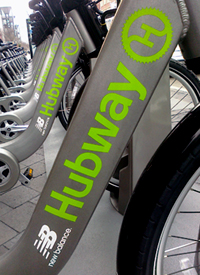 The New Balance Hubway bike sharing program re-launches in Boston tomorrow. Sixty percent of the stations will open, with the remainder scheduled to offer bike rentals by April 1.
The New Balance Hubway bike sharing program re-launches in Boston tomorrow. Sixty percent of the stations will open, with the remainder scheduled to offer bike rentals by April 1.
Hubway opened last July and had a busy first season with 3,650 cyclists signed up as annual members. The system, which is partially funded by the Federal Transit Administration, is operated by Alta Bike Share in partnership with Boston Bikes, an initiative of the City of Boston.
Cyclists can join as annual members for $85 per year or use the system as casual members and pay $12 for 3 days or $5 for 24 hours. The first 30 minutes of each ride is included in the cost, with riders paying for additional time based on their membership plan.
The schedule for opening bike rental stations could be delayed depending on weather conditions. Hubway recommends cyclists visit the Station Map page of its website to monitor progress, follow the program on Facebook or Twitter or download its free Spotcycle application to their smart phone.
The Boston bike accident lawyers at Breakstone, White & Gluck offer these safety tips for cyclists and drivers to avoid cycling accidents:
For Cyclists:
Wear a helmet. Protect yourself from sustaining injuries in bicycle accidents. Your purchase agreement with the Hubway program also requires it. Riders can purchase helmets when they register for the program. Helmets may also be available at some stations and the program has arranged for a number of local retailers to offer helmets at a discounted price of $7.99.
Cyclists should generally ride to the right of traffic, on the right side of the road. Bicyclists may also operate in bike lanes where available and in the center of the lane. Up to two bicyclists may travel abreast in the same lane. Cyclists are not permitted to ride on sidewalks in business districts and many areas of Boston.
Cyclists should never ride against traffic. They have to stop at red lights and stop signs just like motor vehicle traffic.
For Drivers:
Watch your speed! Drivers should travel at the speed limit or slower when conditions involving other vehicles, cyclists or pedestrians warrant it. Unless posted otherwise, state law requires drivers to travel at 30 mph in thickly settled or business districts and 40 mph outside of these areas.
Drivers should take caution turning to avoid bike accidents. Drivers who are turning left must yield the right of way to cyclists.
Drivers should look before they exit a parked car so as not to injure or impede the travel of a passing cyclist. This is illegal, can cause bicycle accidents and carries a fine of up to $100.
Drivers must have adequate room to pass a cyclist. They must also have enough space before returning back to the lane.
Related:
- Facts About Cycling in Massachusetts
- What to Know if You’ve Been Injured in a Bicycle Accident
- New Balance Hubway Program
- Bicyclists Can Protect Themselves By Buying Extra Car Insurance
- MassBike
Cambridge and Somerville Ranked Among Top U.S. Cycling Cities
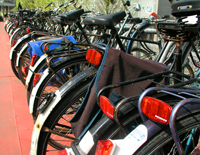 Local cyclists have long known Cambridge and Somerville offer some of the best riding in Greater Boston. But a popular website now says they are among the foremost biking destinations in the nation.
Local cyclists have long known Cambridge and Somerville offer some of the best riding in Greater Boston. But a popular website now says they are among the foremost biking destinations in the nation.
The Street.com recently released its 10 Best U.S. Bike Cities of 2011 list, naming Cambridge the fifth best bicycling city and Somerville the ninth. Boulder, Colorado was the leader.
Cambridge was praised for the strong network of bicycle lanes and shared lane space along the Massachusetts institute of Technology (MIT) campus and nearby technology companies, such as Genzyme, Sanofi Aventies, Biogen Idec and Akamai.
Cambridge bicyclists make up 8.5 percent of the city’s population. The city has several bike shops. Cambridge Police are active in educating the public about taking steps to prevent bicycle accidents. The Cambridge Bicycle Committee has been working to improve safety conditions and reduce bike accidents since 1991.
Somerville was recognized for its bicycling infrastructure and the strong community support for bicyclists. Some 5 percent of the city’s residents are cyclists. Many riders are college students, who account for 16 percent of the population. The city neighbors Medford, home to Tufts University, and Cambridge, where Harvard University, MIT, Leslie University and Cambridge College are all based.
Somerville was praised for its “walkable, accessible squares,” and bicycle-friendly businesses, which offer Tour de France specials, bicycle valet services and benefits for local bike groups. Businesses also host an annual bike party that shuts down a portion of Davis Square.
Somerville has several bike shops and formed the Somerville Bicycle Committee in 2001. The committee has overseen development of new bike lanes, sharrows and multi-use paths to prevent bicycling accidents and personal injuries. It has also guided the development of on-street bike parking in corrals and the ongoing installation of bike racks.
To read the 10 Best U.S. Bike Cities of 2011 report, click here.
Click here to learn more about Massachusetts bicycling laws.
Read More

